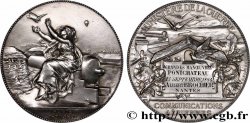fme_621380 - III REPUBLIC Médaille, Élection de Jules Grévy
150.00 €(Approx. 160.50$ | 129.00£)
Quantity
Add to your cart

Type : Médaille, Élection de Jules Grévy
Date: 1879
Metal : bronze
Diameter : 73 mm
Orientation dies : 12 h.
Engraver OUDINÉ Eugène-André (1810-1887)
Weight : 197,1 g.
Edge : lisse + corne BRONZE
Puncheon : corne BRONZE
Coments on the condition:
Exemplaire nettoyé. Traces de frottements dans les champs
Obverse
Obverse legend : RÉPUBLIQUE - * FRANÇAISE.
Obverse description : Tête de la République à gauche en Cérès, déesse des moissons, portant un collier de perles, un double chignon et une couronne composite de blé, fleurs, olivier et olives, chêne et glands, nouée par un ruban descendant sur le cou et passant sur le front où est inscrit le mot CONCORDE ; sous la tranche du cou le long du listel OUDINÉ.
Reverse
Reverse legend : 30 JANVIER 1879 / L’ASSEMBLÉE NATIONALE / ELIT / JULES GRÉVY / PRÉSIDENT / DE LA RÉPUBLIQUE // DE MARCERE.
Reverse description : Légende en six lignes dans une couronne de chêne. Nom du récipiendaire à l’exergue.
Commentary
Cet exemplaire est conservé dans une boîte cartonnée marron. Elle fut remise au sénateur Émile de Marcère, né en 1828. Ce dernier est représentant en 1871, ministre, député de 1871 à 1884 et membre du Sénat en tant que sénateur du Nord jusqu’à son décès le 26 avril 1918. Il est surtout connu pour avoir été le dernier sénateur inamovible de la IIIe République.
Pour plus d’informations consultez ce site : https://www.senat.fr/senateur-3eme-republique/deshayes_de_marcere_emile1513r3.html.
Jules Grévy, né le 15 août 1807, à Mont-sous-Vaudrey (Jura) et mort le 9 septembre 18911 dans la même commune, est un homme d'État français. Avocat de profession, parlementaire engagé aux côtés des républicains, il est arrêté lors du coup d'État de 1851. À la tête de l'Assemblée nationale de 1871 à 1873, il préside ensuite la Chambre des députés. Il est président de la République française du 30 janvier 1879 au 2 décembre 1887, date de sa démission à la suite du scandale des décorations..
Pour plus d’informations consultez ce site : https://www.senat.fr/senateur-3eme-republique/deshayes_de_marcere_emile1513r3.html.
Jules Grévy, né le 15 août 1807, à Mont-sous-Vaudrey (Jura) et mort le 9 septembre 18911 dans la même commune, est un homme d'État français. Avocat de profession, parlementaire engagé aux côtés des républicains, il est arrêté lors du coup d'État de 1851. À la tête de l'Assemblée nationale de 1871 à 1873, il préside ensuite la Chambre des députés. Il est président de la République française du 30 janvier 1879 au 2 décembre 1887, date de sa démission à la suite du scandale des décorations..








 Report a mistake
Report a mistake Print the page
Print the page Share my selection
Share my selection Ask a question
Ask a question Consign / sell
Consign / sell
 Full data
Full data



